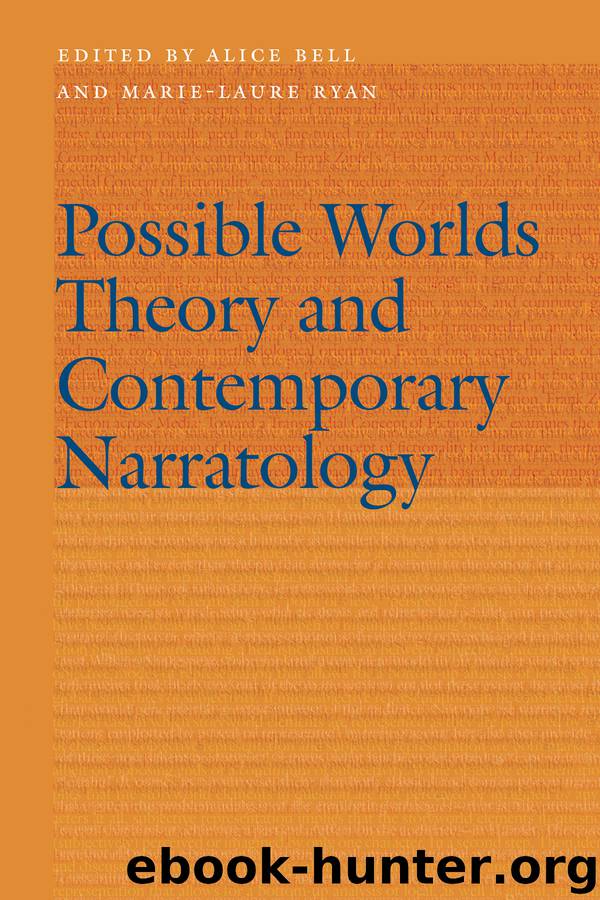Possible Worlds Theory and Contemporary Narratology by Bell Alice; Ryan Marie-Laure; & Marie-Laure Ryan & Alice Bell & Marie-Laure Ryan

Author:Bell, Alice; Ryan, Marie-Laure; & Marie-Laure Ryan & Alice Bell & Marie-Laure Ryan
Language: eng
Format: epub
Tags: LIT006000 Literary Criticism / Semiotics & Theory, Literary Criticism, Semiotics & Theory
Publisher: U of Nebraska Press
Published: 2019-01-01T00:41:57.876000+00:00
But let me also take my emotional response to this story into consideration. When I experience the various instances of time travel described in Heinlein’s narrative, I do not inspect a preexisting picture-like image. Instead, I engage in an embodied exploration of and thus enact what is experienced in the storyworld. Indeed, “What really matters,” according to Caracciolo, is “the experiential nature of our imaginings” (2014, 100).
It is notably not only the case that the “unmarried mother” is extremely sad; the temporal agent and first-person narrator, the ultimate source of the character duplicates, is decidedly unhappy as well. At the end, he realizes that he only deals with versions of him- or herself and thus longs for real Otherness. More specifically, the temporal agent seeks to reach beyond the boundaries of the text by addressing the implied reader: “I know where I came from—but where did all you zombies come from?” (Heinlein [1959] 1980, 215, emphasis original). Furthermore, he says, “You aren’t really there at all. There isn’t anybody but me . . . here alone in the dark. I miss you dreadfully” (215, emphasis original).
Given this desperate (and perhaps even heartbreaking) yearning for real Otherness, one might read this short story as a critique of the solipsism with which the self-referentiality of postmodernism correlates (see also Currie [1998] 2011, 171). In the preface to “All You Zombies,” we are told that “solipsism” is “the theory that nothing really exists outside the self.” In addition, it “can be a terrifying concept in the hands of a skilled writer like Robert A. Heinlein” (Heinlein [1959] 1980, 205). Indeed, in Heinlein’s narrative, the first-person narrator has “engineered a world where he/she . . . is its own first and final cause” (Slusser and Heath 2002, 14) but has become tired of engaging in the construction of convoluted event sequences that involve only duplicate versions of him/herself. Instead, s/he yearns for a real dialogue or confrontation with somebody else, a true encounter of Otherness. In the words of Elana Gomel, “All the significant others in his/her life are him/herself”; “s/he has never had a relationship with an Other” (2010, 57).
Download
This site does not store any files on its server. We only index and link to content provided by other sites. Please contact the content providers to delete copyright contents if any and email us, we'll remove relevant links or contents immediately.
| Books & Reading | Comparative Literature |
| Criticism & Theory | Genres & Styles |
| Movements & Periods | Reference |
| Regional & Cultural | Women Authors |
4 3 2 1: A Novel by Paul Auster(11786)
The handmaid's tale by Margaret Atwood(7445)
Giovanni's Room by James Baldwin(6806)
Asking the Right Questions: A Guide to Critical Thinking by M. Neil Browne & Stuart M. Keeley(5355)
Big Magic: Creative Living Beyond Fear by Elizabeth Gilbert(5349)
Ego Is the Enemy by Ryan Holiday(4950)
On Writing A Memoir of the Craft by Stephen King(4658)
The Body: A Guide for Occupants by Bill Bryson(4578)
Ken Follett - World without end by Ken Follett(4441)
Bluets by Maggie Nelson(4258)
Adulting by Kelly Williams Brown(4230)
Eat That Frog! by Brian Tracy(4147)
Guilty Pleasures by Laurell K Hamilton(4114)
White Noise - A Novel by Don DeLillo(3828)
The Poetry of Pablo Neruda by Pablo Neruda(3813)
Fingerprints of the Gods by Graham Hancock(3731)
Alive: The Story of the Andes Survivors by Piers Paul Read(3725)
The Book of Joy by Dalai Lama(3692)
The Bookshop by Penelope Fitzgerald(3615)
